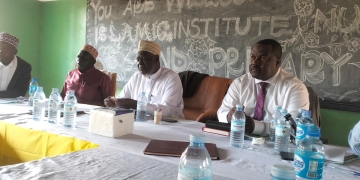
The Uganda Human Rights Commission (UHRC) has revealed that 70 per cent of Police Officers in Uganda reported unfairness in deployments, transfers and promotions.
According to the UHRC report recently submitted to Parliament, police officers who are not happy with how they are being deployed and promoted pointed the finger at corrupt tendencies, favouritism, tribalism, nepotism, ‘technical know-who’ and bribery/kickbacks.
With these allegations, the police officers interviewed by UHRC also revealed that their morale has further gone down because of the poor pay.
The details are contained in the report that was handed over to Deputy Speaker Thomas Tayebwa. The report was about the research conducted on the welfare of the Uganda Police Force.
In this report, UHRC expressed shock at how Police Officers have continued to render services in Uganda, given the deplorable working conditions in which they are forced to operate.
“The research revealed high levels (70 per cent) of unfairness in deployments, transfers and promotions due to underhand methods, corrupt tendencies, favouritism, tribalism, nepotism, ‘technical know-who’, bribery/kickbacks. Personnel had to individually foot the cost of their relocation, regardless of the process or factors for deployment or transfer. However, training was said to be, to a greater extent, conducted in a professional manner and the content good and relevant to the day-to-day policing duties, said Mariam Wangadya, Chairperson, UHRC.
The Commission also revealed that Police Officers are living in extremely unimaginable deplorable living conditions where some officers are sharing guns and rooms that are only separated by curtains.
“The research found that generally, the living and working conditions of UPF personnel were wanting, and in some cases, it was to extreme, unimaginable levels. The situation of housing/accommodation in UPF was dire, with institutional accommodation largely dilapidated, comprising shared rooms partitioned by either curtains or makeshift boards; condemned structures and uniports unfit for human habitation, remarked Wangadya.
UHRC also defended the research titled, ‘Squeezing Water out of a Stone? Working and living conditions of the Uganda Police Force personnel and their implications on the observance of human rights’ with Wangadya revealing that both the professional and non-professional categories in the Force stated that the salary was very low and too inadequate to match the increasing cost of living and their welfare.
She informed Parliament that many of the officers interviewed preferred payment of salaries based on the workload one carries and also on the ranks so that the payment difference does not demotivate personnel.
“Nonetheless, 47 per cent of the respondents said the inadequate pay did not affect their duty to observe human rights. It was amazing how, in their given conditions, they could still manage to provide any service. At times, they had to share guns, ask complainants to transport officers, use “wanainchi” (civilians) to carry accident victims, use ropes in lieu of handcuffs, walk with suspects to court in the absence of vehicles, and use observation to detect crime in lieu of required gadgets, among others. Nevertheless, some of their strategies were found to be high risk with a likelihood of causing or promoting human rights violations, added Wangadya.
UHRC noted that many Police Officers lived between 3-8 km away from the workstation, while 3 per cent lived up to 14 km away and despite this, the administration of Uganda Police did not facilitate their staff with organised transport to and from work yet they were on call 24 hours.
“Junior personnel were the most disadvantaged in terms of acquiring decent housing as they were often displaced from institutional accommodation by senior personnel. Some personnel opted to live in their homes or voluntarily rent outside institutional accommodation but these faced concerns about their personal security outside the barracks as well as affordability of decent housing that maintains the corporate image of UPF, read in part the report.
Deputy Speaker Tayebwa thanked Police officers for continuing to work despite the challenges they are facing, and he called for a deeper study on the impact of the silence of Police officers and further establish why more Ugandans are fighting to join the Force despite the current challenges faced by the Force.
“That doesn’t mean they shouldn’t be demanding these services; they should be demanding for them, but I really want to thank them. No one has stopped working because they don’t have housing, but now we have to go and study the impact of this silence. Are they finding other means? Why are many people dying to join the Police despite these conditions? said Tayebwa.
He added: Police put up an advert, I have received over 100 calls, help me I join Police. Is there another driving factor? Is it corruption? Are they finding a way of mitigating the situation? It is something we should interest ourselves in as a government, and just don’t say these guys are doing a great job; they are comfortable, and we take it for granted.










